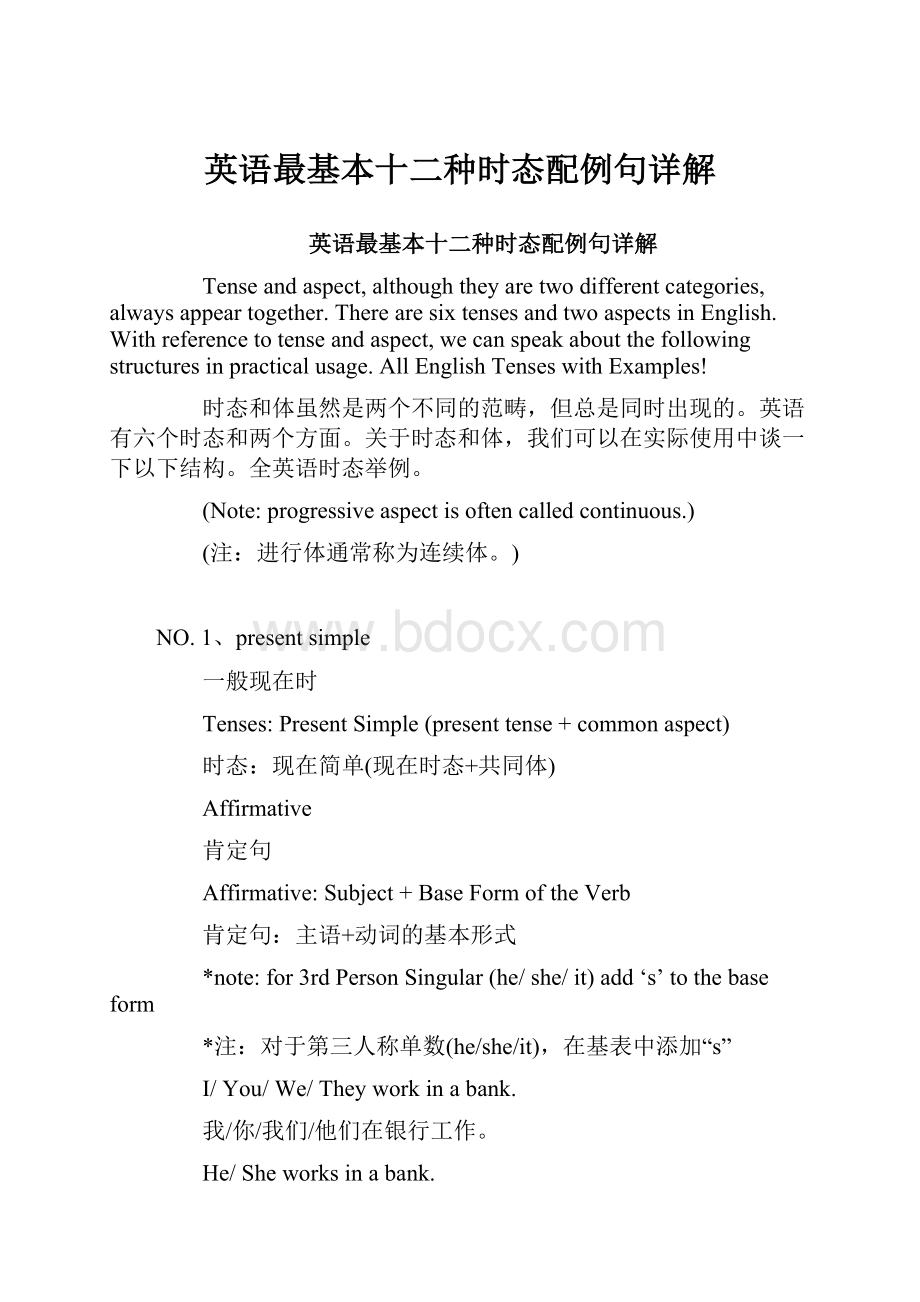英语最基本十二种时态配例句详解.docx
《英语最基本十二种时态配例句详解.docx》由会员分享,可在线阅读,更多相关《英语最基本十二种时态配例句详解.docx(18页珍藏版)》请在冰豆网上搜索。

英语最基本十二种时态配例句详解
英语最基本十二种时态配例句详解
Tenseandaspect,althoughtheyaretwodifferentcategories,alwaysappeartogether.TherearesixtensesandtwoaspectsinEnglish.Withreferencetotenseandaspect,wecanspeakaboutthefollowingstructuresinpracticalusage.AllEnglishTenseswithExamples!
时态和体虽然是两个不同的范畴,但总是同时出现的。
英语有六个时态和两个方面。
关于时态和体,我们可以在实际使用中谈一下以下结构。
全英语时态举例。
(Note:
progressiveaspectisoftencalledcontinuous.)
(注:
进行体通常称为连续体。
)
NO.1、presentsimple
一般现在时
Tenses:
PresentSimple(presenttense+commonaspect)
时态:
现在简单(现在时态+共同体)
Affirmative
肯定句
Affirmative:
Subject+BaseFormoftheVerb
肯定句:
主语+动词的基本形式
*note:
for3rdPersonSingular(he/she/it)add‘s’tothebaseform
*注:
对于第三人称单数(he/she/it),在基表中添加“s”
I/You/We/Theyworkinabank.
我/你/我们/他们在银行工作。
He/Sheworksinabank.
他/她在银行工作。
Negative
否定句
Negative:
Subject+don’t/doesn’t+BaseFormoftheVerb
动词:
主语+don’t/doesn’t+动词的基本形式
I/You/We/Theydon’t(donot)work.
我/你/我们/他们不工作。
He/She/Itdoesn’t(doesnot)work.
他/她/它不起作用。
InterrogativeInterrogative:
QuestionWord+do/does+Subject+BaseFormoftheVerb
疑问句:
疑问词+do/does+主语+动词的基本形式
WheredoI/you/we/theywork?
我/你/我们/他们在哪里工作?
Wheredoeshe/shework?
他/她在哪里工作?
1.Usual,regularaction:
1.常规的动作:
Iusuallygofishingatweekends.Idon’tgofishingatweekends.DoIgofishingatweekends?
/Youalwaysknowtheanswer.Youdon’talwaysknowtheanswer.Doyoualwaysknowtheanswer?
/Sheneverputsmilkinhertea.Shedoesn’tputmilkinhertea./Doessheeverputmilkinhertea?
/Myfatherplaystheviolin.Myfatherdoesn’tplaytheviolin.Doesyourfatherplaytheviolin?
/WesometimesgotothecinemaonFriday.Wedon’tgotothecinemaonFriday.DowegotothecinemaonFridays?
/Theyneverwalkinthewood.Theydon’twalkinthewood.Dotheywalkinthewood?
我通常周末去钓鱼。
我周末不去钓鱼。
我周末去钓鱼吗?
/你总是知道答案。
你并不总是知道答案。
你总是知道答案吗?
/她从不在茶里放牛奶。
她不在茶里放牛奶。
/她在茶里放过牛奶吗?
/我父亲拉小提琴。
我父亲不会拉小提琴。
你父亲拉小提琴吗?
/我们有时星期五去看电影。
我们星期五不去看电影。
我们星期五去看电影吗?
/他们从不在树林里走。
他们不在树林里走。
他们在树林里散步吗?
2.Generalexistence;statingafact:
2.普遍存在;陈述事实:
Anostrichhastwolegs.Arabbitdoesn’thavetwolegs.Howmanylegsdoesaspiderhave?
/Theearthgoesroundthesun.Thesundoesn’tgoroundtheearth.Doesthemoongoroundtheearth?
/Waterisliquidatroomtemperature.Goldisn’tliquidatroomtemperature.Isgoldsolidatroomtemperature?
鸵鸟有两条腿。
兔子没有两条腿。
一只蜘蛛有几条腿?
/地球绕太阳转。
太阳不绕地球转。
月亮绕地球转吗?
/水在室温下是液态的。
金在室温下不是液体。
金在室温下是固态的吗?
3.Dramaticnarrative(theatre,sports,etc.events):
3.戏剧叙事(戏剧、体育等活动):
Johnsontakestheball,hebouncesittothefloor,thenhethrowsandscorestwopoints.
约翰逊接过球,把球弹到地板上,然后投进并得到2分。
4.Timetables
4.时间表
Thetrainleavesathalfpastfour.Thetraindoesn’tleaveatfive.Whattimedoesthetrainleave?
/Thecoursestartson1July.Thecoursedoesn’tstartinJune.Whendoesthecoursestart?
火车四点半开。
火车五点不发车。
火车什么时候开?
/课程从7月1日开始。
课程不会在六月份开始。
课程什么时候开始?
NO.2、presentprogressive
现在进行时
PresentProgressive(presenttense+progressiveaspect)
现在进行时(现在时+进行体)
Affirmative:
Subject+BE+Verb-ING
肯定:
主语+BE+动词ING
Youarecooking.
你在做饭。
Negative:
Subject+BEnot+Verb-ING
否定:
主语+非主语+动词ING
Youaren’t(arenot)cooking.
你不是在做饭。
Interrogative:
QuestionWord+BE+Subject+Verb-ING
疑问句:
疑问词+BE+主语+动词ING
Whatareyoucooking?
你正在做什么饭?
1.Actionhappeningnow:
1.正在进行的动作:
I’mwatchingafilmonTVnow.I‘mnotwatchingafilm.AmIwatchingafilm?
/Watchout,acar’scoming.Itisn’tnotcoming.Isitcoming?
/Theboysaresleepingupstairs.Theyboysaren’tsleepingupstairs.Aretheboyssleepingupstairs?
我正在电视上看电影。
我没在看电影。
我在看电影吗?
/小心,有车来了。
不会来的。
它来了吗?
/孩子们正在楼上睡觉。
他们不是在楼上睡觉。
孩子们在楼上睡觉吗?
2.Actionhappeningaboutthistime,butnotnecessarilynow:
2.行动发生在这个时候,但不一定是现在:
He‘sstudyingSpanishandGerman.He‘snotstudyingFrench.Whatlanguagesishestudying?
/They‘regoingtoabusinesscourse.Theyaren’tgoingtoacookingcourse.Whatcoursearetheygoingto?
/You‘revisitingmuseumswhileyou’rehere.You‘renotvisitingfactories.Areyouvisitingmuseumsinourcity?
他在学西班牙语和德语。
他没有学法语。
他在学什么语言?
/他们要去上商业课。
他们不去上烹饪课。
他们要上什么课?
/你来的时候正在参观博物馆。
你不去参观工厂。
你在参观我们城市的博物馆吗?
3.Definitearrangementinthenearfuture:
3.近期明确安排:
I‘mtravellingtoParistomorrow.I‘mnottravellingtoParistomorrow.AmItravellingtoParistomorrow?
/Mysonistakinghisgirlfriendtodinnertonight.Mysonisn’ttakinghisgirlfriendtodinnertonight.Ishetakinghisgirlfriendtodinnertonight?
/You‘regoingtoItalyonholidaythisyear,aren’tyou?
Youaren’tgoingtoGreece.Whereareyougoingonholidaythisyear?
我明天要去巴黎旅行。
我明天不去巴黎了。
我明天要去巴黎吗?
/我儿子今晚要带他女朋友去吃饭。
我儿子今晚不带他女朋友去吃饭。
他今晚要带女朋友去吃饭吗?
/你今年要去意大利度假,是吗?
你不会去希腊的。
今年你打算去哪里度假?
NO.3、pastsimple
一般过去时
Tenses:
PastSimple(pasttense+commonaspect)
时态:
过去式(过去式+共同体)
Affirmative:
Subject+VerbinPastSimple(2ndform)
肯定:
过去式简单句中的主语+动词(第二种形式)
I/You/He/She/It/We/TheylivedinLondontenyearsago.
我/你/他/她/它/我们/他们十年前住在伦敦。
Negative:
Subject+didn’t(didnot)+BaseFormoftheVerb
否定:
主语+不(不)动词的基本形式
I/You/He/She/It/We/Theydidn’tlikethefilm.
我/你/他/她/它/我们/他们不喜欢这部电影。
Interrogative:
QuestionWord+did+subject+BaseFormoftheVerb
疑问句:
疑问词+did+主语+动词基本形式
WheredidI/you/he/she/it/we/theymeetRichard?
我/你/他/她/它/我们/他们在哪里见过理查德?
Actions,eventsinthepast:
过去的行动、事件:
IhadlunchwithMrsRobinsonyesterday.Ididn’thavelunchwithMrsRobinsonyesterday.DidIhavelunchwithMrsRobinsonyesterday?
/MotherwenttoworkonTuesday.Motherdidn’tgotoworkonTuesday.DidMothergotoworkonTuesday?
/Youdidtheshoppingthismorning.Youdidn’tdotheshoppingthismorning.Wheredidyoudotheshoppingthismorning?
/ShetravelledtoSpainlastyear.Shedidn’ttravelanywherelastyear.Wheredidshetravellastyear?
我昨天和罗宾逊太太吃了午饭。
我昨天没有和罗宾逊太太一起吃午饭。
我昨天和罗宾逊太太吃午饭了吗?
/妈妈星期二去上班了。
妈妈星期二没去上班。
妈妈星期二去上班了吗?
/你今天早上去买东西了。
你今天早上没去买东西。
今天早上你在哪里买的东西?
/她去年去了西班牙。
她去年哪儿也没去旅行。
她去年去哪儿旅行了?
NO.4、PastProgressive
过去进行式
Tenses:
PastProgressive(pasttense+progressiveaspect)
时态:
过去进行时(过去时+进行体)
Affirmative:
Subject+was/were+Verb-ING
时态:
过去进行时(过去时+进行体)
I/He/Shewashavingashowerwhenyoucalled.
你打电话的时候我/他/她正在洗澡。
We/You/TheywerewatchingTVwhenBobarrived.
鲍勃到达时我们/你/他们正在看电视。
Negative:
Subject+wasn’t(wasnot)/weren’t(werenot)+Verb-ING
否定:
主语+wasn’t(wasnot)/weren’t(werenot)+动词ING
I/He/Shewasn’thavingashowerwhenyoucalled.
你打电话的时候我/他/她没有洗澡。
We/You/Theyweren’watchingTVwhenBobarrived.
鲍勃来的时候我们/你/他们正在看电视。
Interrogative:
Questionword+was/were+Verb-ING
疑问句:
疑问词+was/were+动词ING
WhatwereyoudoingwhenBobarrived?
/Whatwasshedoingwhenyoucalled?
鲍勃来的时候你在干什么?
/你打电话的时候她在干什么?
Actioninprogressinthepast:
过去正在采取的行动:
Iwasworkinginthegardenwhenmysisterarrived.Iwasn’tworkinginthegardenwhenmysisterarrived.WasIworkinginthegardenwhenmysisterarrived?
/Wewerewatchingafilmattenlastnight.Weweren’twatchingafilmattenlastnight.Werewewatchingfilmattenlastnight?
/Shewasplayingwiththekidsfromeighttonine.Shewasn’tplayingwiththekidsfromeighttonine.Whowassheplayingwith?
我姐姐来的时候我正在花园里干活。
我姐姐来的时候我不在花园里干活。
我姐姐来的时候我正在花园里干活吗?
/昨晚十点我们在看电影。
昨晚十点我们没在看电影。
昨晚十点我们在看电影吗?
/她从八点到九点和孩子们一起玩。
她从八点到九点都没和孩子们玩。
她在和谁玩?
NO.5、PresentPerfectSimple(presentperfecttense+commonaspect)
一般现在完成时(现在完成时+共同体)
Affirmative:
Subject+have/has+PastParticiple(3rdFormoftheVerb)
肯定:
主语+have/has+过去分词(动词的第三种形式)
I/You/We/Theyhavefinishedtheletter.
我/你/我们/他们已经写完了这封信。
He/Shehasfinishedtheletter.
他/她已经写完了信。
Negative:
Subject+haven’t(havenot)/hasn’t(hasnot)+PastParticiple
否定:
主语+have't(havenot)/have't(hasnot)+过去分词
Negative
否定
I/You/We/Theyhaven’tfinishedtheletter.
我/你/我们/他们还没写完这封信。
He/Shehasn’tfinishedtheletter.
他/她还没写完信。
Interrogative:
QuestionWord+have/has+PastParticiple
疑问句:
疑问词+have/has+过去分词
HaveI/you/we/theyfinishedtheletter?
我/你/我们/他们写完信了吗?
Hashe/shefinishedtheletter?
他/她写完信了吗?
1.Actionwitharesult:
1.有结果的行动:
Sorry,I‘veparkedatthewrongplace.Ihaven’tparkedatthewrongplace.HaveIparkedatthewrongplace?
/You‘ve(already)printedtheletters.Youhaven’tprintedtheletters(yet).Haveyouprintedtheletters(yet)?
/We‘ve(already)donetherooms.Wehaven’tdonetheroomsyet.Havewedonetherooms(yet)?
/Hehasalreadyrepairedthelawn-mower.Hehasn’trepairedthelawn-moweryet.Hasherepairedthelawn-moweryet?
对不起,我把车停错地方了。
我没把车停错地方。
我停错地方了吗?
/你已经把信打印出来了。
你还没有把信打印出来。
你把信打印出来了吗?
/我们已经把房间整理好了。
我们还没有整理房间。
我们整理房间了吗?
/他已经修好了割草机。
他还没修好割草机。
他修好割草机了吗?
2.Actioninincompletetime:
2.不完全时间内的行动:
Ourfriendshavevisitedusfourtimesthissummer.Ourfriendshaven’tvisitedusthissummer.Howmanytimeshaveourfriendsvisitedusthissummer?
/I‘vebeentothecinemaalotlately.Ihaven’tbeentothecinemalately.HaveIbeentothecinemalately?
/You‘vebeenonholidaythisyear.Youhaven’tbeenonholidaythisyear.Haveyoubeenonholidaythisyear?
我们的朋友今年夏天来过我们四次。
我们的朋友今年夏天没有来看我们。
今年夏天我们的朋友来过我们几次?
/我最近常去看电影。
我最近没去看电影。
我最近去看电影了吗?
/你今年休假了。
你今年没有休假。
你今年休假了吗?
3.Actioninthepastwithoutsayingwhen:
过去的行动,不说何时:
JanehasalreadybeentoItaly.JanehasneverbeentoItaly.HasJaneeverbeentoItaly?
/Youhavealreadyswuminthislake.Youhaven’tswuminthislakeyet.Haveyoueverswuminthislake?
/You‘vebeentothehairdresser’s.Youhaven’tbeentothehairdresser’s.Wherehaveyoubeen?
简已经去过意大利了。
简从未去过意大利。
简去过意大利吗?
/你已经在这个湖里游泳了。
你还没在这个湖里游泳。
你在这个湖里游泳过吗?
/你去过理发店。
你没去过理发店。
你去哪儿了?
4.Actionbeginninginthepastandstillcontinuing:
4.过去开始并仍在继续的行动: